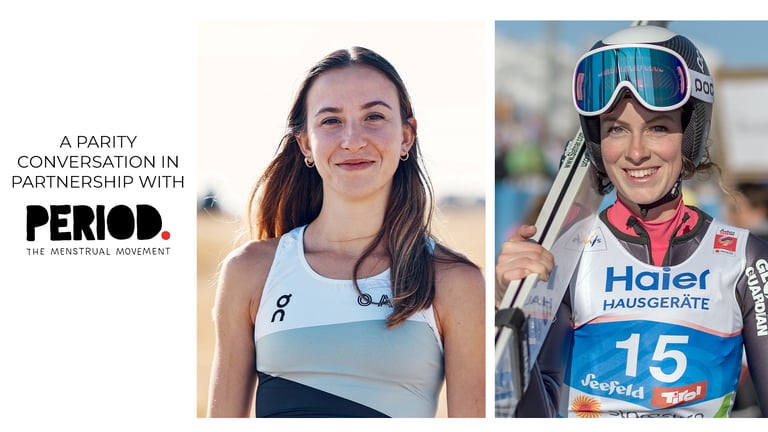 Photo: Pro athletes Carmela Baéz and Nina Lussi. Credit: On Running; Ailura
Photo: Pro athletes Carmela Baéz and Nina Lussi. Credit: On Running; Ailura
We're all about uplifting women athletes and showcasing their countless (and often undervalued) strengths both during and after competitions. Unfortunately, navigating menstruation as an athlete - pro or not - isn't talked about enough and leaves many without important info on how to properly care for their bodies.
That's why we partnered with PERIOD. to support its annual State of the Period campaign. This global, youth-powered non-profit is working to eradicate period poverty and stigma through the distribution of period products, comprehensive menstrual health education, and systemic policy change.
Ahead of #PeriodActionDay on October 8, Parity athletes Nina Lussi and Carmela Baéz had an open conversation with PERIOD. Communications Manager Emily Swanigan about their own menstrual health. You can watch the full video here or read the transcript below.
Nina Lussi:
Hi, I'm Nina Lussi. I'm a professional ski jumper from Lake Placid, New York. I’m really excited to be here and to spread the word about period awareness!
Carmela Baez:
And I am Carmela Baez! I'm a professional distance runner for Spain and I'm also very excited to be here to learn more about and support period awareness.
Emily Swanigan:
You both clearly have gotten to such an amazing level in your careers to become pro athletes, so congratulations to you both!
What were your experiences when you first got your period, and what was it like when you started figuring out how to compete while on your period?
Nina:
I got my first period at a Ski Jumping Junior Nationals. Luckily, I have an older sister who happened to be there with me, so that really helped things out.
Ski jumping is a mostly male sport, so it wasn't really a conversation I wanted to have with one of my teammates. I was really happy to have my sister there.
From there it took a lot of getting used to adjusting to and figuring out body changes, especially for a sport like ski jumping — we’re trying to fly. It's important to be on your game and with body fluctuations, that was kind of tough for a while, but those were the early days.
Carmela:
I used to do gymnastics before I ran, so I actually first got my period while I was in gymnastics class. I wasn't even a runner yet! My period was regular and stable by the time I started running.
That really also shifted my perspective since I didn't have to go through the phase of body changes as much while competing in track and field. It was later when I had already kind of gotten in there.
I don't remember talking a lot about my period with my teammates in gymnastics. We mostly just asked around about whether someone got it or if you didn’t have it yet. So, my period was more something that was inconvenient and kind of happened. It wasn't until I got to college that these conversations became more common and more open.
Emily:
It’s interesting how those memories you have talking about your period for the first time or hearing others talk about periods kind of stick with you.
Tell me more about any conversations with coaches or adults in your life that shaped how you understood your period, and how to deal with it while training.
Carmela:
I lost my period in high school for a couple of months, and then got injured right after. That’s when I started realizing everything is connected.
I was lucky to have a trainer with my team that checked all of my hormones when this injury happened and made sure I was okay. Since then, I haven’t had any big bone injuries. The role that coaches and trainers played for me was huge. That being said, I started to really have those conversations in college, mainly on the impact of having your period or not having it, and how it impacts your bone density.
Nina:
I started to notice that there seemed to be a correlation for me with my period and knee injuries. I tore my ACL at the 2018 Olympic Trials and one of my former teammates had asked me if I had my period. I was actually just finishing it up.
She was like, "Well, see? I knew it."
I wasn’t sure what to do because I’m not controlling the schedule – was I not supposed to compete? It was just an interesting moment where I really began to practice warming up longer or activating certain muscles when I do have my period.
Alternatively, I notice certain times during my cycle when I feel really strong. It’s helped me check in with myself and push myself more depending on where I am in the month. It really helped my training, but it took me a long time to come to that self-realization. I didn’t get there until my mid-twenties.
I had a coach, who was a guy, that told me that we had to be very open with each other and my period was something important to discuss for our success as a team. Ski jumping is so weight-specific so talking about my weight fluctuations made our relationship better and gave me like a 5% increase in my training.
I think the earlier we can start the conversation, the better.
Emily:
Wow, that's so interesting. I don't think I knew or really connected the dots about the correlation between knee injuries and periods. I’m not a doctor, but it's definitely true that as you go through your menstrual cycle, you go through different phases with your hormones. When you’re training and performing every day, you’re going to notice the effects and changes in your body.
Are there any adjustments you’ve made to your training schedule according to your menstrual cycle?
Carmela:
At the end of the day, I need to get my mileage in and I need to do the reps. Some days you feel better, and some days you feel worse. There are definitely ways that my period affects me, but there are so many other things that are connected, too. Sometimes it's hard to pinpoint specifically what it is.
I know that when I’m in my menstrual phase, I really need to emphasize resting and recovering. I make sure I nap and get a good night’s sleep. In terms of training, I haven’t changed much besides communicating with my coach about anything that might impact my practice. I’ve also emphasized nutrition, like making sure I’m getting enough anti-inflammatory foods.
Nina:
It’s difficult to adjust training, especially in the winter, because you’re traveling from one competition to the next. I was trying to maintain the form that I built in the summer, but even in the summer months, you’re not yet at peak form.
I found the biggest difference when I started strength training.
Emily:
Thank you both for sharing that. Our followers would love to hear either of your thoughts on how athletes talk about amenorrhea, which is losing your period, and general issues around periods.
Nina:
I have never lost mine, but I know some teammates who did because ski jumping is a weight-determined sport.
I think that it is important to recognize when that happens and to be aware of when you’re pushing your body into a new zone.
Carmela:
I agree with Nina. I'm getting to a point where I'm very aware of my body and what I need. I have a lot of time to make sure I'm fueling myself properly. But I know not everyone is in that place, especially high schoolers.
Be aware that if you lose your period, something probably has to change. Go to a professional and don’t stress about it more than you should.
Do everything you can to fix the problem – don’t feel like you can’t talk about it or that you have to hide it and keep it to yourself.
Nina:
Talking about it is especially important because I don't think you need to feel guilty about it. Because basically it just means you're training hard. I'm not encouraging it. But I understand the point is that you want to be the best version of yourself that you can be.
Emily:
Yes! Your period is a really important health indicator. It's something that tells you things are operating as normal. It’s a really natural part of maturity, of growing up. I would encourage everyone to really be aware of their menstrual cycle.
Obviously when you're starting out, if you're a high schooler or a middle schooler and you haven't, it's not necessarily going to be fully regulated yet and that's okay. Talk to a trusted adult if you have any concerns.
Finally, one last question before we wrap up: What advice would you give your younger self or young athletes listening today?
Nina:
When I was younger, I wasn't super excited about being labeled as a female. I was just a tomboy and I wanted to be tough. When my period came and I was like, “Oh no, what does this mean? Do I have to turn into a girly girl?” I was thinking of my hormones changing and I was like, "Oh no, maybe everything's going to change."
Moral of the story. Everything did not change. I've still stayed myself. I've really come to appreciate the female body and what it can do.
We put our bodies through a lot – I'm trying to recognize that and see our menstrual cycles as kind of a superpower. It’s hard to embrace, but it’s a process.
Carmela:
I love that you called it a superpower because it's like a skill you have that you have to figure out. The same with anything in training, you have to become more aware of it.
The advice I would give is to really learn how your body functions, how it feels.
The more I progress in my sport, the more I want to feel everything that I'm feeling. You want to feel the little pain in the knee and recognize if it's pain or if it's just soreness. It’s the same thing with your period, just really learning to understand your body.
It can also be a lot of fun, like when I'm in my menstrual phase, I start to prepare food that I know will make my body feel really good. When I do these things for myself, I have so much more energy. It’s a way to be entertained and excited about what’s going on within your body and take it all in.
Nina:
For me, getting my period is actually more of a relief because I get very emotional and mood swingy beforehand, which is really a terror for myself even, let alone those around me. So when I get my period, I'm like, “Okay, we're done with that.” I feel myself slowly coming back into my own.
It’s nice to keep tabs on that because then if you're feeling super weird you can just look at the calendar and be like, "Oh well that's that. I get it."
Emily:
I love the idea of leveraging your menstrual cycle to perform at a higher level and to compete because we can. It’s 100% a superpower. Women can do literally anything.
You're both living testament of just really, really impressive and inspiring athletes.
#PeriodActionDay is October 8, 2022. Take action to end period poverty in our lifetime.
Visit www.periodactionday.com
Follow us on Instagram, LinkedIn, Twitter, Facebook, and TikTok to stay up-to-date on Parity news.
